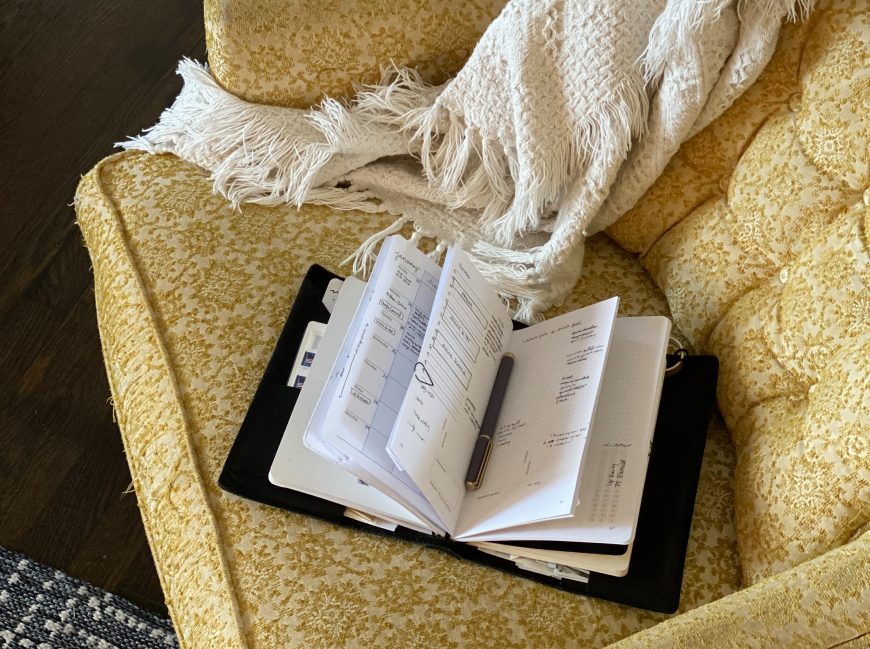the Blog

Guest Post: How to Draw More Inspiration (Instead of Feelings of Failure) From Your Planner
This is such a delightful post, because it was written by Meeka Malone, mother of the sister-founders of Evergreen Planner, McCauley and Shelby.
Mama has always challenged us to reach for excellence, and to never settle with making excuses for ourselves. It's been so fun to watch our Mama embrace this planner system that we created and gain a whole host of brand new skills in time-management and goal-setting for herself.
She's been a behind-the-scenes secret weapon for the success of our business, from staying up late into the night helping us field test and work out the last kinks on our ROOTED Goals Workbook to watching her very large gaggle of grandkids so we can record the Make Space to Thrive Podcast.

How to Prioritize (The First Domino Effect)
If you've been in our community for long, you know that I (Shelby) have often shared that I am not a natural at prioritization. It was watching my younger sister McCauley live her ordinary (and yet remarkable) life that propelled me into the time-management space. She's a queen at getting the right things done, the right way, at the right time, and in the right amount of time. I'm the late bloomer in that area.
When I'd complain about how much better her life was than mine (just keeping it real here), she'd always go back to the same thing: prioritization.
That answer really used to annoy me because I didn't have a clue about how to prioritize. I'd try to get her to explain to me how she figured out what she needed to do next—and she didn't know how to explain it to me! She'd just kind of look at everything she had on her plate and then...know. It honestly seemed like magic to me.
It took me reading stacks of time-management books and articles, binging podcasts, and enrolling into workshops and webinars to start to get a sense for how this prioritization thing worked. From that research, I hobbled together some planning worksheets that applied the 80/20 rule to the Eisenhower Matrix, and helped me translate all of that into a time-blocked plan for my day. (It was actually in showing those worksheets to McCauley that the idea for the Evergreen Planner was sparked in the first place!)

The Brain That Organizes Itself
Several years ago I read a book titled The House that Cleans Itself by Mindy Starns Clark. The topic of the book was home organization, but the author took an approach that was entirely new to me. The gist of it was this: instead of spending so much time cleaning up your house as is, take the time to set up your home in a way that it will clean itself.
She recommended you take time to really evaluate your home, including taking pictures to give yourself a new perspective, keeping an eye out for messy spots in the home, and to get really, really specific about the types of things you were always cleaning (be it toy blocks, laundry, shoes, school bags, etc.). Once you knew what was causing most of the cleaning issues, you could brainstorm extremely specific solutions for those issues.

Recap of Podcast Season 2 Episodes

Ask Us Anything #1 - Podcast Episode 16
Have you wondered how we approach planning? Or what advice we give when we talk with friends about planning? Are you simply curious to know more about us?
For the final episode of this season of our podcast, we dive into questions we received from our community! They range from personal questions, to planner-related questions, to general productivity questions.
Join us for a laid back and fun conversation!

Time-Blocking Made Simple - Podcast Episode 15
Time-blocking is a powerful productivity tool for maximizing the amount of time you have available, and for liberating your time to focus on what matters most. Yet over the years of talking to women who use our planner (and others who have a heart for intentional living), we’ve found that many of people are intimidated by the concept of time-blocking, don’t know how to make it work for them, or simply feel like it’s just too structured and stiff.
We totally get this! No one wants to feel pressure to make their intuitive daily rhythms “work” on paper before they're "allowed" to move forward on them. No one wants to feel like there’s no flexibility for spontaneity, or to feel false-guilt when things don’t go “as planned.”
Thankfully, the way we approach time-blocking feels nothing like putting a straight-jacket on your day.

Identifying Your Productivity Season - Podcast Episode 14
Although productivity and time-management resources seldom address this reality, different seasons of life significantly affect your productivity in different ways. It can be easy to get caught up into thinking we should be able to plan and execute tasks regardless of what is happening around us, but this simply isn’t the case. Your productivity is going to fluctuate based on the season you find yourself in, and that's not a bad thing.
As we've studied our lives and others', we've come to identify three seasons of our productive lives. Everyone goes through these seasons (and it's possible to be in between seasons), but the key is to recognize each season early, and to understand and embrace the ways your current season will inevitably impact your productivity. In fact, knowing what season you're in and having clarity about the types of goals and tasks you should be focusing on in that season, is a key component to a sustainable time-management strategy.

Why You Need A Hub for Your Brain - Podcast Episode 13
A few years ago, I read this crazy statistic that shocked me. It said the average person spends 5,000 hours in their lifetime looking for misplaced items. Ladies, that's over 6 months solid spent feeling totally disorganized, simply trying to unblock your progress. I think the reason this hit me so hard was that I completely identified with this statistic. I knew it had to be accurate based on how I tended to feel in that season of my life. I also knew that this disorganized, fretful overwhelm was seriously holding me back from accomplishing the big goals I deeply cared about.
I realized I needed a hub for my brain—a one-stop home for #allthethings I was trying to juggle. I knew that if I could capture the important details of life in one place, then I could arrange the tasks I needed to do into my schedule, and my brain would have everything it needed to prioritize and stay intentional with my time. The Evergreen Planner was born out of this desire to finally feel truly organized.
Now, when I'm feeling spacey, I have a single place I can come back to in order to know what tasks I need to tackle next. This tool has saved me so much of the precious time that I used to waste spinning my wheels, and empowers me to be more present in my home, stay on top of my daily todos, and weekly make progress on those bigger goals and dreams that motivate me to stay intentional.

How to Build a Morning & Evening Rhythm - Podcast Episode 12
Effective yet flexible rhythms are one of the key building blocks in a sustainable and intentional lifestyle. But trying to copy a guru’s routine, whether for work or home life, quickly becomes overwhelming. There are dozens of “best practices” out there, so where do you start? How do you decide what you need in your personal rhythms?
Create a rhythm for your unique lifestyle
In this episode of the podcast, you'll get long look into how each of us approaches our morning and evening rhythms. Although we all have similar values—and we're even in similar stages of life—each of our rhythms look different.
Here's the thing about rhythms: they have to be crafted for your lifestyle, congruent with your season of life, and based on what you and your family value. I remember listening to a podcast years ago that said that "'should' is not a sustainable why." This idea holds true for rhythms. Feeling like you "should" get up before the kids, will not be a strong enough "why" when your alarm goes off at 6am. But if you begin to know in your core—because you've taken the time to reflect on your personal experience—that getting up before the kids sets you up for a better, more peaceful morning, this core knowing can easily become a very strong "why."

6 Tips to Get Out of the Crazy - Podcast Episode 11
When you are in an overwhelming season, it can be hard to know where to even begin. Crazy seasons can come out of nowhere, and often come from things outside of your control. But what we have found is that when you go back to the basics, and gently work on getting back to your life-giving rhythms, that there is always something you can do to relieve some of the pressure.
The steps below aren’t pie-in-the-sky ideas, these are the real steps we have each taken to bring more peace to the chaotic seasons we’ve been through.

How To Do Lists Hinder Your Productivity - Podcast Episode 10
We know the to-do list cycle all too well.
You have a hundred things rattling around in your brain, so you write out a massive list out on a piece of paper, and then jump into frenzied action.
But you feel like you're spinning your wheels, like you are working all the time, and still have so much to-do and can't get ahead of the to-do list that grows faster than you can manage.
The Problem with To-Do Lists
To-do lists tend to fragment your focus. Alone, they can never be the time-management strategy you need to organize your tasks within the context of your week. To-do lists encourage you to take action, but it is most often un-prioritized action, meaning you will never make progress on the things that actually matter most to you.

Quickstart Your Planning - Podcast Episode 9
You want to create a personalized time-management strategy and maximize your planner. But you're not sure where to start or how to keep making the space to figure it all out when you're still trying to juggle everything you already have on your to-do list.
If that sounds like you, then you're our people.
And you need the Quickstart Your Planning Guide.
About This Episode
If you listened to the first season of our podcast, you’ll remember our Four Rules of Planning. Those rules were a helpful start, but in the months after publishing those episodes we realized a couple of things...
First, we don’t like rules. We like planning strategies that are personalized to each individual, and rules can rarely accomplish that level of customization.
Second, we couldn’t easily remember the four rules… and we wrote them. We knew that wasn't going to work; we needed something easy to grasp that was memorable.


